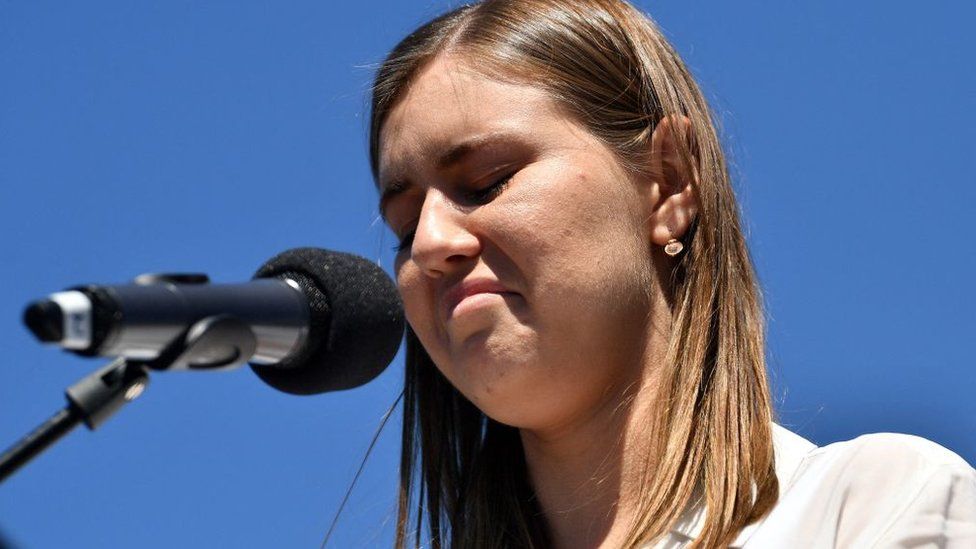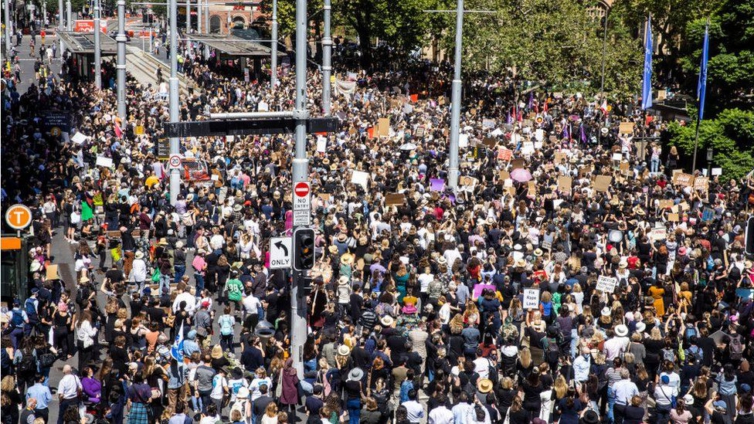Tens of thousands of people have turned out to marches across Australia, protesting against the sexual abuse and harassment of women in the country.
They were spurred by a recent wave of allegations of sexual assault, centred around Australia's parliament.
The allegations have focused scrutiny on the conservative government.
The protests were organised a week ago, after Attorney General Christian Porter revealed he was the subject of a 1988 rape allegation - which he denies.
A separate case - that of Brittany Higgins, an ex-political adviser who alleged in February that she was raped in a minister's office in 2019 - has also fuelled public anger.
Protesters feel the government's response to the sexual assault allegations has been inadequate.
Ms Higgins spoke to the thousands of protesters outside Parliament House on Monday, saying: "There is a horrible societal acceptance of sexual violence experienced by women in Australia."
"My story was on the front page for the sole reason that it was a painful reminder to women that if it can happen in Parliament House, it can truly happen anywhere."

What happened at the protests?
The protest rallies - known as the March 4 Justice - formed from noon on Monday across 40 cities and towns in Australia including the major capital cities of Canberra, Sydney and Melbourne as well as smaller country towns.
Organisers suggested it could be the "biggest uprising of women that Australia's seen".
Many attendees carried placards and wore black in protest. In Melbourne, protesters carried a long banner listing the names of women killed in acts of gendered violence in the past decade.
Organisers at the Canberra rally also presented a petition to lawmakers with over 90,000 signatures calling for greater accountability of sexist behaviours in parliament.
They have also called for Mr Porter - a senior government minister -to stand aside. Police have closed their case against the attorney general, but others have argued for a separate inquiry into the allegation against him.
How has the government responded?
Prime Minister Scott Morrison declined to meet the protesters despite their urging, and was forced to defend his decision in parliament.
On Sunday, he had invited a delegation to meet with him in Parliament House but protest organisers declined, arguing that he and the government's minister for women should meet with them at the rally.
"We have already come to the front door, now it's up to the Government to cross the threshold and come to us. We will not be meeting behind closed doors," tweeted march organiser Janine Hendry on Monday.
Most government lawmakers declined to join the rallies. However the Labor opposition and several other prominent lawmakers joined the crowd in Canberra.
Latest Stories
-
Illness, mental health, other factors fuel worker absenteeism in Ghana – Report
10 minutes -
Boycott any invitation from ORAL team – Minority to former gov’t officials
32 minutes -
NDC’s Chief Kwamigah congratulates Volta regional minister-designate
36 minutes -
Culture Forum writes to Mahama ahead of culture minister appointment
45 minutes -
Agribusiness consultant advocates for transformative plan to boost Ghana’s food security and economic growth
49 minutes -
Mechanic jailed 10 years jail for robbing student
55 minutes -
Prof. Maxwell Darko Asante appointed Director of CSIR-Crops Research Institute
58 minutes -
Taskforce arrests 5 suspected illegal miners at Wenchi-Atuna
59 minutes -
No serious gov’t will entertain ORAL – Minority
1 hour -
Ashanti Region recorded 1,172 fire cases in 2024
1 hour -
Obed Psych and Lamisi unite on new single ‘Together Forever’
2 hours -
Kantamanto fire: Sprinter Benjamin Azamati donates GH¢10k to victims
2 hours -
BlacVolta redefining entertainment and lifestyle media in Accra’s Detty December
2 hours -
T-bills auction: Government to raise GH¢6.35bn on January 17, 2025
2 hours -
African Trade Chamber inducts 120 into 2025 Future Trade Leaders Fellowship
2 hours

